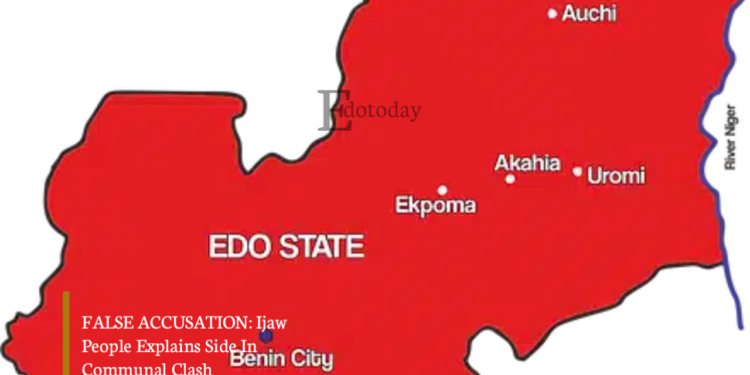Following a confrontation between some migrant cocoa farmers and Izon teenagers who were suspected of stealing farm products, the people of the Gbelemotin village in Edo State’s Ovia South-West Local Government Area have absolved themselves of responsibility for the recent fatalities in the area.
Five individuals were killed in the confrontation, which also resulted in the burning of homes and other property, according to the Edo State Command, which confirmed the incident.
Moses Yamu, the Command’s spokesperson, had just promised that the Command was pursuing the offenders and would hold them all accountable.
The indigenous people of Gbelemotin have long been the victims of migrant Yoruba cocoa growers who have long since encroached on their land to plant cocoa, according to a statement released by the community on Sunday.
The community further mentioned that the migrant cocoa farmers agreed to provide the Gbelemotin community a token payment in exchange for growing their cash crops as a form of settlement.
The statement, which was approved by Karaem Evimibowei and provided to reporters in Benin on Sunday, said that the Yoruba migrant cocoa growers had developed the practice of using a vigilante organization they had established to assault their young people.
The statement emphasized that the farmers seemed to have the support of some influential government figures, which is why the harassment of the Gbelemotin indigenous people persisted.
According to the statement, which detailed the harassment they had endured over the years, the Yoruba farmers gradually started to infringe on the free uncultivated lands set aside for Ijaw people by growing beyond the initial areas they were permitted to plant.
When the Yoruba farmers began accusing the Ijaw farmers of stealing their cocoa—a charge the community denied—tension in the area increased.
“They went further to prevent indigenes of Gbelemotin from passing through the roads and footpaths leading to other Ijaw communities”, the statement added
According to the report, many of the indigenous people were accused of stealing, assaulted, and hurt, and women were not exempt from these attacks.
The migrant farmers allegedly established a vigilante organization led by Igbala, which the community claimed they were employing to carry out their schemes against the natives.
The statement reads: “The situation took a deadly turn last year when a young Ijaw man, a married man and father of children, was murdered by the vigilante group while returning from a funeral in Jide village.”
“When an eyewitness of that incident accompanied a delegation from one of the communities went to the police to report the killing and seek justice, he was unjustly arrested on false charges, further confirming that the authorities were not on our side.”
Shortly thereafter, an Urhobo kid who climbed to gather wild palm trees was shot dead by a vigilante, according to Ebimobobowei, and the police allegedly ignored the incident.
According to the statement, the most recent killings occurred because Ijaw teenagers heard that their people were being attacked and went to save them, only to be ambushed once more by the cocoa farmers and their vigilantes.
“When news of the attack reached the village, the youths were outraged; they mobilised to search for their missing brothers, hoping to rescue some that may have survived the onslaught.”
“While searching the bushes, they were ambushed again by the vigilante group. However, they managed to fight back and successfully rescued two seriously wounded victims who had been left for dead.”
“At the end, we lost four of our youth, two of whose bodies were taken away by the murderous and escaping vigilantes led by an Ikale man named Igbala, who happened to be the Head of the Vigilantes. Several other youths of Gbelemotin returned with gunshot injuries.”
“It is necessary to point out that this same Igbala is fond of using his powers as a vigilante to harass both women and youth as they move daily on the earth’s roads”.
Ebimobobowei said the narrative being spread by the cocoa farmers portraying the Gbelemotin indigenes as the aggressors was not true and urged the government and security agencies to carry out a thorough investigation, insisting that as Ijaw, they “have the right to live peacefully and work in their homeland.”












